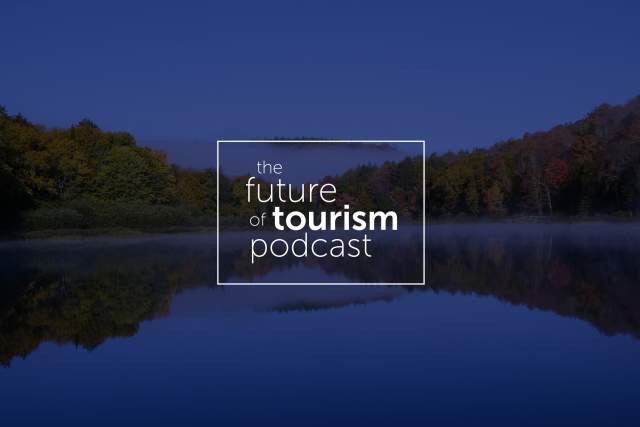In this time of global crisis and uncertainty, we put the call out to leaders, CEOs, strategists and consultants to sit down and tell us, in their own words, what is going on and what is going to happen next in this vital global industry.
Greg Klassen is ready to talk turkey about a new normal in global tourism
We are well past romanticizing about a miraculous recovery, a quick flip of the switch, or a speedy return to the way it was. Greg says he is ready to dig in on what this crisis, COVID-19, is going to mean going forward for the industry and destination organizations alike.
“The challenges are monumental,” acknowledges Greg, but then again he's no stranger to Herculean tasks. He is the former CEO of the Canadian Tourism Commission, the architect of the wildly successful marketing strategy for 2010 Vancouver Winter Olympic Games, a Faculty Member at the Royal Rhodes University School of Tourism and Hospitality, and a partner and principal at Twenty31 Consulting.
His first words of advice to the industry he has served so well for so long, are remarkably similar to what Amir Eylon of Longwoods International said on the show back in April. “Destination operators who look in their rearview mirrors to guide them to the future are looking the wrong way. Our existing business model at its core is almost irrelevant for 18 months or more, and maybe changed forever. We're sitting in the driver's seat, seat belt on, we've checked the rear view and we're ready to drive forward. What do we do next?”
Greg says we need to figure out our own competitive advantages as a destination, rather than relying on the organic growth that came our way over the past 20 years. He points out that as air-access proliferated, disposable income soared and the accommodation sector grew at an incredible rate, the industry saw an unprecedented, albeit artificial growth curve that for the most part had little to do with the direct efforts of destination organizations. That will not be the case going forward.
 “Tourism's been an accidental success in many respects. I know that a lot of us love to point to our strategic prowess for the growth of tourism, but that growth happened largely due to external factors outside of much of our control,” says Greg. “The deregulation of airlines, low cost carriers, the investment that countries were making in tourism and the growth of the internet, all of those things have changed how we've done business and has supported this fast growth of tourism.”
“Tourism's been an accidental success in many respects. I know that a lot of us love to point to our strategic prowess for the growth of tourism, but that growth happened largely due to external factors outside of much of our control,” says Greg. “The deregulation of airlines, low cost carriers, the investment that countries were making in tourism and the growth of the internet, all of those things have changed how we've done business and has supported this fast growth of tourism.”
“But now,” says Gregs, “we’ve got to look and say, ‘what are the levers that we have to help us grow tourism?’ Some of those levers that we got by accident are no longer there. Now we have to figure out how we can create our own competitive advantages as destinations, how we can sort of see into the future and determine where we are going to put our efforts.”
Greg and I agree that there is latency in the industry, and that many of the trends that are going to shape the future are already in play and have been for a number of years. The future is already here, it’s just not evenly distributed.
Destination alignment across multiple key verticals - civic, citizen, stakeholder and visitor - are proving to be the essential platform for sustainable, managed and desirable growth. Sharing the role and function of storytelling and product development with our partners isn't just good business and sound co-investment, it is also the foundation of an engaged destination taking an active role in defining its collective tourism future. And, as Jack Johnson and Andreas Wiessenborn so passionately advocate, “the language we use to communicate the benefits and value of tourism in our communities has to change.”
Greg reminds me of one of those steely-eyed missile men of 1960s fame who helped to get us to the moon in less than a decade with their clarity of focus and commitment to flawless execution. But make no mistake, Greg also has huge compassion for this industry. Again, much like Amir Eylon, Greg sees the immediate role for destination organizations is to be one of helping.
The big question on his mind: “How can we help destinations, given the caring nature of tourism? How can we add support for communities, add support for local cultures and of course, provide that return on investment they need from tourism specifically because of its opportunities to employ people and provide quality of life.”
These days Greg literally works around the globe, from the high arctic to South Africa and all points in between. His observations on this crisis are at a global level. “We're working with a lot of destinations right now, a couple of them in Canada, but many of them in other parts of the world like South Africa, the Middle East, Abu Dhabi, as well as Dubai, and Jordan. And they're all at different stages of dealing with the challenges that they're facing right now. I do see some of them really looking and saying the pause button is a gift.”
"What are the levers that we have to help us grow tourism?"
In that moment of pause, Greg sees opportunity, “[Clients] like South Africa are looking and saying, how can we rebuild our organization? How can we help rebuild our tourism industry so that it really reflects the vision that we have for South Africa's tourism industry in the future, one that is maybe more about quality, one that is more about management.”
“It really is just that kind of change that some of our destinations are looking at,” says Greg. “And I really, really love to be part of that story. I'm really excited about it.”
As a parting thought he adds this, “there's so many great technologies in tourism right now and almost all of them go underutilized. We are still focused on the billboard and the full page cooperative ad in the national newspaper; these are complimentary media, we don't necessarily want to lose them because they do play a role and awareness creation, but we need to compliment them with being and using the digital technologies.”
“Instead of a $1 million campaign, we can now do 100 campaigns for $10,000 each to find the aficionados, the avids, those communities of interest and those who are willing and actually eager to travel to have that experience. Whether it's mountain biking or hiking or rock climbing or frankly, just, you know, hanging out and playing chess with other people around the world. There are aficionados for that and we have to find them and tap into their media, and that's mostly digital. Is it the blog? Is it the social media posts? Is it the media that they're reading? Can we pull together a composite of personas and then target them and then inspire and compel them to choose our destination for that purpose?”
Working with destinations to develop a vision to propel them in the future, to align around civic and citizen priorities, to change the language and landscape of tourism, and to advance the use of the tools and technologies that will get us there faster, that’s what Greg Klassen is doing and doing well.
Thank you Greg, keep on keeping on!

